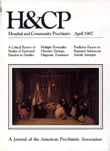Expressed Emotion in Families: A Critical Review
Abstract
Research on expressed emotion in the families of schizophrenic patients has seemed to offer a new perspective on environmental factors that cause relapse in schizophrenia. A review of the literature, however, reveals that while expressed emotion may predict relapse, there is no evidence that it causes relapse, Nor does the evidence support the continued linkage of the three components of expressed emotion—criticism, hostility, and emotional overinvolvement—in a single global variable. The authors also question the clinical significance of expressed emotion ratings and believe that treatment strategies based on them tend to blame relatives for the patient's continuing difficulties. They suggest that clinicians assess family responses in the context of the patient's behavior and life situation before helping families develop more effectual coping strategies.
Access content
To read the fulltext, please use one of the options below to sign in or purchase access.- Personal login
- Institutional Login
- Sign in via OpenAthens
- Register for access
-
Please login/register if you wish to pair your device and check access availability.
Not a subscriber?
PsychiatryOnline subscription options offer access to the DSM-5 library, books, journals, CME, and patient resources. This all-in-one virtual library provides psychiatrists and mental health professionals with key resources for diagnosis, treatment, research, and professional development.
Need more help? PsychiatryOnline Customer Service may be reached by emailing [email protected] or by calling 800-368-5777 (in the U.S.) or 703-907-7322 (outside the U.S.).



